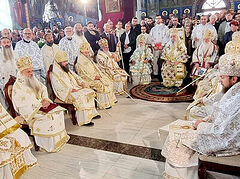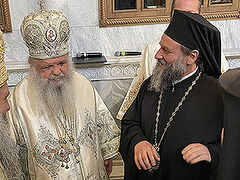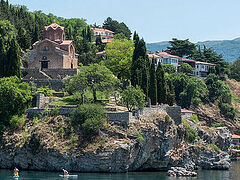Kiev, November 23, 2022
 Abp. Stefan of Ohrid. Photo: Wikipedia By decision of the Ukrainian Holy Synod today, the name of the primate of the Macedonian Orthodox Church-Ohrid Archbishopric has been added to the diptychs of the primates of the Local Orthodox Churches to be commemorated at the Divine services, reports the Ukrainian Orthodox Church’s Information-Education Department.
Abp. Stefan of Ohrid. Photo: Wikipedia By decision of the Ukrainian Holy Synod today, the name of the primate of the Macedonian Orthodox Church-Ohrid Archbishopric has been added to the diptychs of the primates of the Local Orthodox Churches to be commemorated at the Divine services, reports the Ukrainian Orthodox Church’s Information-Education Department.
The Synod of the canonical UOC met at the Holy Dormition-Kiev Caves Lavra this morning under the chairmanship of His Beatitude Metropolitan Onuphry of Kiev and All Ukraine, who will from now on commemorate His Eminence Archbishop Stefan of Ohrid in the services.
The UOC thus recognizes the MOC as both canonical and autocephalous.
Recall that after the UOC’s Council in May in which it removed all connection to the Russian Orthodox Church from its statutes, Met. Onuphry began to commemorate the diptychs of the primates of the Local Churches during the Divine services, according to the practice of Orthodox primates.
The UOC’s decision comes less than a month after the Council of Bishops of the Polish Orthodox Church decided to recognize and enter into communion with the Macedonian Church.
Thus far, the canonicity of the MOC has been formally recognized by (in addition to the Patriarchate of Serbia which granted it autocephaly) the Synods of the Patriarchates of Constantinople, Bulgaria, Russia, and Antioch, and the Churches of Greece and Poland.
Whereas the Russian, Polish, and now Ukrainian Churches explicitly recognize the autocephaly of the Macedonian Church, the Church of Greece explicitly rejects it on the grounds that only Constantinople can grant autocephaly, though it nevertheless accepts the Macedonian Church as canonical.
MOC hierarchs and clergy have also concelebrated with hierarchs and clergy from the Churches of Jerusalem, Romania, the Czech Lands and Slovakia, and the Orthodox Church in America, though their Synods have not formally addressed the issue.
Thus far, there have no been Synodal decisions from or concelebrations with hierarchs or clergy of the Churches of Alexandria, Georgia, Cyprus, and Albania.
Follow OrthoChristian on Twitter, Vkontakte, Telegram, WhatsApp, MeWe, and Gab!




Greece as a Nation-State was born in the 19th century, the century in which most of the Nation-States were born, except for those that were born at the end of the 18th century (France, United States, Haiti). To form these nation-states, national identity became a monolithic and homogeneous concept.
If we went back to the times of the Great Schism, all the Greeks in the Empire would feel like Romans. The current Greek identity combines historical facts with fictions invented by politicians.
Greek was spoken in Macedonia, yes, which, like all non-standardized languages, was a set of dialects where one of the most prestigious prevails over the rest. The Greeks were not born from a specific grandson of Noah, but several peoples with different identities became homogenized by living in the same region.
At first it would only be Achaia (that is why the Iliad speaks of Achaeans), then it included Macedonia, Thrace and a good part of present-day Turkey. Later, just as Macedonia and Thrace became Hellenized, today North Macedonia is Slavic.
Following your nationalist logic, if the European part of Turkey became independent, would it be forbidden to use the name Thrace?